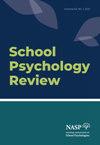It’s Not That They Are Big, It’s Just That They Are Black: The Impact of Body Mass Index, School Belonging, and Self Esteem on Black Boys’ School Suspension
IF 3
3区 心理学
Q1 Social Sciences
引用次数: 4
Abstract
Abstract The suspension of Black boys from school is a longstanding issue that places them at increased risk for negative academic and social–emotional outcomes. While risk factors for suspension are often documented, concurrently examining protective factors such as school belonging and self-esteem occurs infrequently. The purpose of this study was to examine the relationships between Body Mass Index (BMI), school belonging, self-esteem, race, gender, and school suspension. Results from the National Longitudinal Study of Adolescent to Adult Health (Add Health) indicated that BMI was a significant predictor of school suspension overall, but not for Black boys. Furthermore our hypotheses were not supported in that regardless of the levels of school belonging for Black boys, their levels of school suspension were not impacted as was the case with their peers. So it was not that they were big, just that they were Black as it relates to school suspension and Black boys. Implications are discussed in terms of the improving outcomes of Black boys. Impact Statement Black boys are suspended from school at higher rates than any group. Large body size is thought to be a risk factor for negative outcomes based on societal perceptions. For Black boys, body mass index does not predict school suspension.不是因为他们大,只是因为他们是黑人:体重指数、学校归属感和自尊对黑人男孩停学的影响
摘要黑人男孩停课是一个长期存在的问题,这使他们面临更大的负面学术和社会情绪后果的风险。虽然停课的风险因素经常被记录在案,但同时检查学校归属感和自尊等保护因素的情况很少发生。本研究的目的是检验身体质量指数(BMI)、学校归属感、自尊、种族、性别和停学之间的关系。国家青少年至成人健康纵向研究(Add Health)的结果表明,BMI是整体停学的重要预测因素,但对黑人男孩来说不是。此外,我们的假设没有得到支持,因为无论黑人男孩的学校归属程度如何,他们的停学程度都不会像同龄人那样受到影响。因此,这并不是说他们大,只是他们是黑人,因为这与停课和黑人男孩有关。讨论了改善黑人男孩成绩的影响。影响声明黑人男孩被停学的比率高于任何群体。基于社会认知,大体型被认为是负面结果的风险因素。对于黑人男孩来说,体重指数并不能预测学校停课。
本文章由计算机程序翻译,如有差异,请以英文原文为准。
求助全文
约1分钟内获得全文
求助全文
来源期刊

School Psychology Review
Social Sciences-Education
CiteScore
6.90
自引率
20.00%
发文量
54
期刊介绍:
School Psychology Review (SPR) is a refereed journal published quarterly by NASP. Its primary purpose is to provide a means for communicating scholarly advances in research, training, and practice related to psychology and education, and specifically to school psychology. Of particular interest are articles presenting original, data-based research that can contribute to the development of innovative intervention and prevention strategies and the evaluation of these approaches. SPR presents important conceptual developments and empirical findings from a wide range of disciplines (e.g., educational, child clinical, pediatric, community.
 求助内容:
求助内容: 应助结果提醒方式:
应助结果提醒方式:


